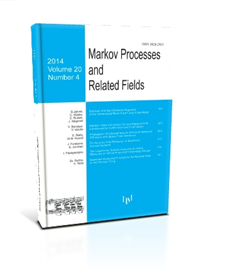Penalisation of the Symmetric Random Walk by Several Functions of the Supremum
P. Debs
2012, v.18, Issue 4, 651-680
ABSTRACT
Call $(\Omega,\mathcal F_\infty,\p,X,\mathcal F)$ the canonical space for the standard random walk on $\mathbb Z$. Thus, $\Omega$ denotes the set of paths $\phi:\mathbb N \to\mathbb Z$ such that ${|\phi(n+1)-\phi(n)|=1}$, $X = (X_n, n\geq0 )$ is the canonical coordinate process on $\Omega$; $\mathcal F = ( \mathcal F _n, n\geq 0 )$ is the natural filtration of $X$, $\mathcal F _\infty$ the $\sigma$-field $\bigvee_{n\geq0}\mathcal F _n$, and $\p_0$ the probability on $( \Omega,\mathcal F _\infty )$ such that under $\p_0$, $X$ is the symmetric nearest neighbour random walk started from $0$. Let $G:\mathbb N \times \Omega \rightarrow {\mathbb R}^+$ be a positive, adapted functional. For several types of functionals $G$, we show the existence of a positive $\mathcal F$-martingale $(M_n,\ n\geq0)$ such that, for all $n$ and all $\Lambda_n\in\mathcal F _n$, \[ \frac{ \e_0 [\mathds{1} \{ \Lambda_n \} G_p] }{ \e_0[G_p]} \longrightarrow \e_0 [\mathds{1} \{ \Lambda_n \} M_n] \quad \text{when } p\rightarrow\infty. \] Thus, there exists a probability $Q$ on $(\Omega,\mathcal F_\infty)$ such that $Q(\Lambda_n) = \e_0[\mathds{1} \{ \Lambda_n \} M_n]$ for all $\Lambda_n\in\mathcal F _n$. We describe the behavior of the process $(\Omega,X,\mathcal F )$ under $Q$. In this paper, we penalised the standard random walk by several functions of its maximum. The aim is to show that in spite of very close penalisation functions, under the new probabilities, the canonical process behaves very differently. We study here five kinds of $G$: $G_p$ is a function of $S_p$ where $S_p$ is the unilateral supremum of $X$. $G_p$ is a function of $S_{g_p}$ where $g_p$ is the last $0$ at the left of $p$. $G_p$ is a function of $S_{d_p}$ where $d_p$ is the first $0$ at the right of $p$. $G_p$ is a function of $S^*_{g_p}$ where $S^*_p$ is the bilateral supremum of $X$. $G_p$ is a function of $S^*_{p}$. A similar study has been realized for other kinds of $G$ (cf. P. Debs (2009) Penalisation of the standard random walk by a function of the one-sided maximum, of the local time, or of the duration of the excursions. In: Seminaire de probabilites XLII. Lect. Notes Math. 1979, 331-363).
Keywords: penalisation,change of probability,random walk,Bessel randomwalk,martingale,supremum
COMMENTS
Please log in or register to leave a comment

